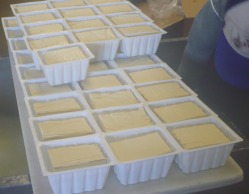About the project

A few years ago, a news story about the UN Food and Agriculture Organization's "Livestock's Long Shadow" report piqued my interest. It said that worldwide, raising livestock contributed a 9 percent share in global climate emissions, and an 18 percent share in climate change (including pasture degradation and land-use change). I was already a vegetarian, and glad to know that I wasn't contributing. But I longed to know: What was the environmental impact of a meat substitute like tofu?
So I visited a conventional soy farm, talked to an organic soy farmer, saw a tofu factory in action and used historical USDA data to figure out the carbon footprint of a pound of tofu.
Luckily, a recent Scientific American article, The Greenhouse Hamburger, (Feb. 2009), calculated the footprint of a pound of factory-farmed beef: a whopping 14.8 pounds. Keep this in mind when you're thinking about tofu's footprint.
So I visited a conventional soy farm, talked to an organic soy farmer, saw a tofu factory in action and used historical USDA data to figure out the carbon footprint of a pound of tofu.
Luckily, a recent Scientific American article, The Greenhouse Hamburger, (Feb. 2009), calculated the footprint of a pound of factory-farmed beef: a whopping 14.8 pounds. Keep this in mind when you're thinking about tofu's footprint.
About the author
Tiffany Plate is a vegetarian, freelance writer who’s passionate about animals, the food we eat, and the environment. Her heroes are Michael Pollan, Francis Moore Lappe, and Mark Bittman. She lives in Boulder, Colo., and enjoys hiking, playing volleyball and kickball, reading, and writing.
To learn more about Tiffany’s writing, visit her website.
To learn more about Tiffany’s writing, visit her website.
